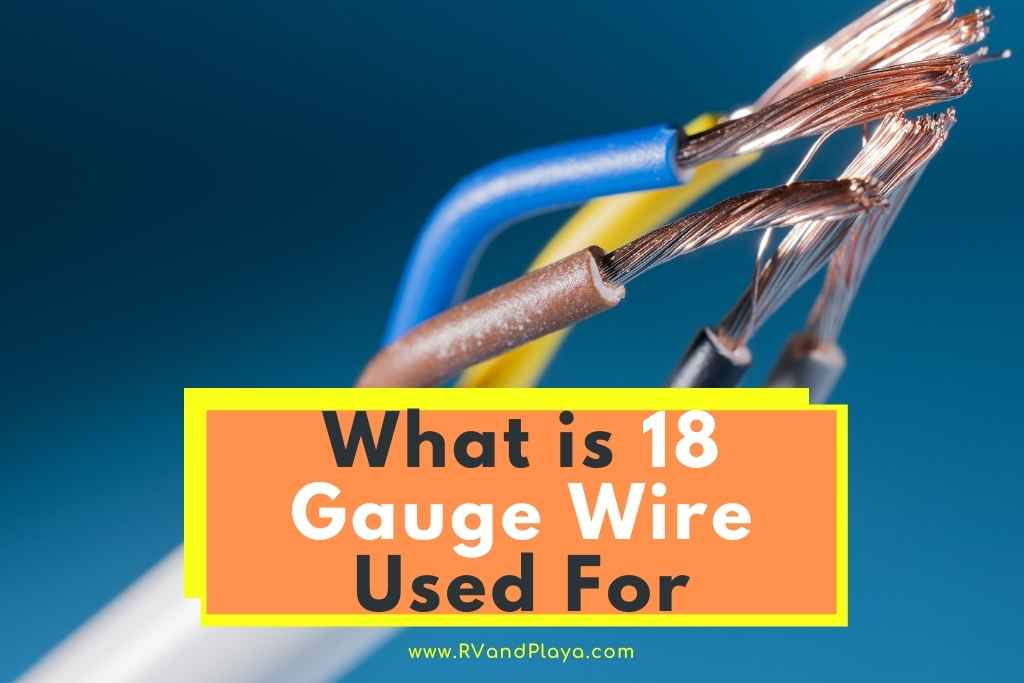Have you ever asked yourself or your friend what an 18 gauge wire is used for? Well, you are at the perfect place to find the answer to such a question.
Unless you’re an electrician, wire gauge size and the applications for all of these sizes, along with the fact that there are both aluminum and copper wires, can be a bit confusing.
This is especially true if you are trying to fix something because if there is one thing you don’t want to do, it’s wire something the wrong way or with the wrong gauge wire.
So, what is 18 gauge wire used for? An 18-gauge wire is going to be primarily used in residential applications, as it is used for low-voltage devices and lighting, such as lamps. It’s also a general-purpose wire found in automobiles.
You’re not going to find much 18-gauge wire in your home, as it is only able to handle 16 amps and only then at short lengths.
If your home lighting was wired in 18-gauge wire, your home would have probably burned down a long time ago.
It is possible to run more than 16 amps through an 18-gauge wire, however, it would need to be much shorter.
Table of Contents
How Much Current Can 18-Gauge Wire Handle?
The problem with wires that have a small diameter, like 18-gauge wiring, is that it suffers from a severe drop-off in how much current it can handle the longer the 18-gauge wire is.
For that reason, you will usually only find 18-gauge wire in things like lamp cords and as an unshielded, short ground wire.
A lot of people assume that something like 120V or 240V is too much for an 18-gauge wire, however, the voltage doesn’t travel through a wire, it is only the force that pushes the current, measured in amperes.
Amps are the current that you need to be concerned with when it comes to any gauge wire, but specifically, 18-gauge wire. Voltage is limited by how thick the insulation is as well.
Oftentimes, you will see the 18-gauge wire that is bare of any insulation, and in those instances, it is being used as a ground wire.
Applications for 18-Gauge Wire
Despite its size and significant limitations, 18-gauge wire is typically found in a lot of the things that you use every day.
When you cut your lamp on or power up your speaker system, plug in a coffee pot, or any other small appliances, you are probably dealing with 18-gauge wire.
You’ll also notice that there are very thing wires in things like ceiling fans, and they connect to larger wires that connect to the wires coming out of your ceiling.
The smaller wires are most likely running from the larger wires to your individual lights on the ceiling fan.
Wires that are 18-gauge in size are often used for little things like that and you will notice that they are tied into larger wires.
You’ll never see the 18-gauge wire inside the walls of your home, but you will frequently find it in home theater systems, digital audio applications, stereo speakers, and similar appliances and applications around the house.
Read also: How Many Amps Can an 18 Gauge Wire Handle (The Truth!)
18-Gauge Wire in Car Speakers
This is where you will find much of the 18-gauge wire in a vehicle. Most of your factory speakers or even your aftermarket speakers are going to have a lot of 18-gauge wire.
You won’t find it in larger speakers or subwoofers, however. It’s also a “general purpose” wire that is used throughout the vehicle for a number of applications.
There is only so much in terms of amps that 18-gauge wire can handle at certain lengths, so if you are installing your own speakers, you should keep a few things in mind.
| 18-Gauge Wire | 3A | 5A | 7.5A | 10A | 15A |
| Length | 12’ | 7’ | 4.5’ | 3.6’ | 2.4’ |
The longer the 18-gauge wire, the less it can handle in terms of amps. When it comes to large speakers and subwoofers, you don’t want to use 18-gauge wire at all, especially if you don’t want to end up starting a fire in your car.
Can You Run a 16-Gauge Wire to an 18-Gauge Wire?
You can but you should never do so. Especially if you know that the 16-gauge wire is running to a power source rated at 10A.
The reverse is possible but only in a situation where the power source is going to be perfect for an 18-gauge wire.
Running from 18 to 16 is perfectly fine since the 16-gauge wire is thicker and can handle anything that you throw at it through the 18-gauge.
Circuit breakers in residential homes don’t have a breaker that is rated for something as small as 18-gauge wire.
Ultimately, you should never run different gauges of wires together unless you are certain that the power source is not going to be too much for the smallest diameter wire that you have.
18-Gauge Wiring for Lighting
Lighting is primarily where you are going to find 18-gauge wire and that includes a variety of applications.
- Landscape Lighting
- LED lighting (just about every kind of LED lighting you can imagine)
- Standing, end table, and desk lamps
- Small lighting applications in ceiling fans
When it comes to your standard lighting fixtures throughout the house, you’ll usually find 14-gauge wiring.
Even though the 18-gauge wire is found mostly in residential and vehicle applications for low voltage lighting and speakers, there just isn’t much use for it on a larger scale.
According to wire gauge sizes and in terms of insulated copper and aluminum wires, 18-gauge is only used with THWN-2, THHN, XHHW-2, and USE-2 insulation at a maximum temperature of 90°C.
You would have to go to a lower gauge wire to cover the remaining insulation categories in either copper or aluminum wiring.
There is no insulation rating for the 18-gauge wire that is made of aluminum. This is why there are so few applications for the wire outside of what is listed.
All Things Considered
18-gauge wire is almost entirely used for low-voltage applications that include lighting, especially LED lighting, and speaker systems that are not overly robust.
You will typically find it in residential settings and rarely in a commercial setting.
In terms of broad usage, 18-gauge wire is one of the lowest on the totem pole, with thicker gauge wires dominating both the residential and commercial sectors.
Here are some of my favorite services, products, and Stores
Thank you for reading this article. I hope it helps you find the most recent and accurate RV, camping information. Here are some services, products, and Stores that I use and hope you´ll also find helpful.
There are affiliate links, so if you do decide to use any of them, I´ll earn a small commission. But in all honesty, these are the exact what I use and recommend to everyone, even my own family.
To see all my of most up-to-date recommendations, check out this resource that I made for you!
References
https://www.trekkyrecords.com/what-is-18-gauge-wire-used-for
Recent Posts
Have you ever asked yourself or your friend how many Amps a 18 gauge wire can handle? Well, you are at the perfect place to find the answer to such a question. When it comes to low power...
When it comes to the gauge (thickness) of copper wire—or aluminum—the allowable current flow is debatable between what is safe and falls within code, and what it can carry. For safety...


